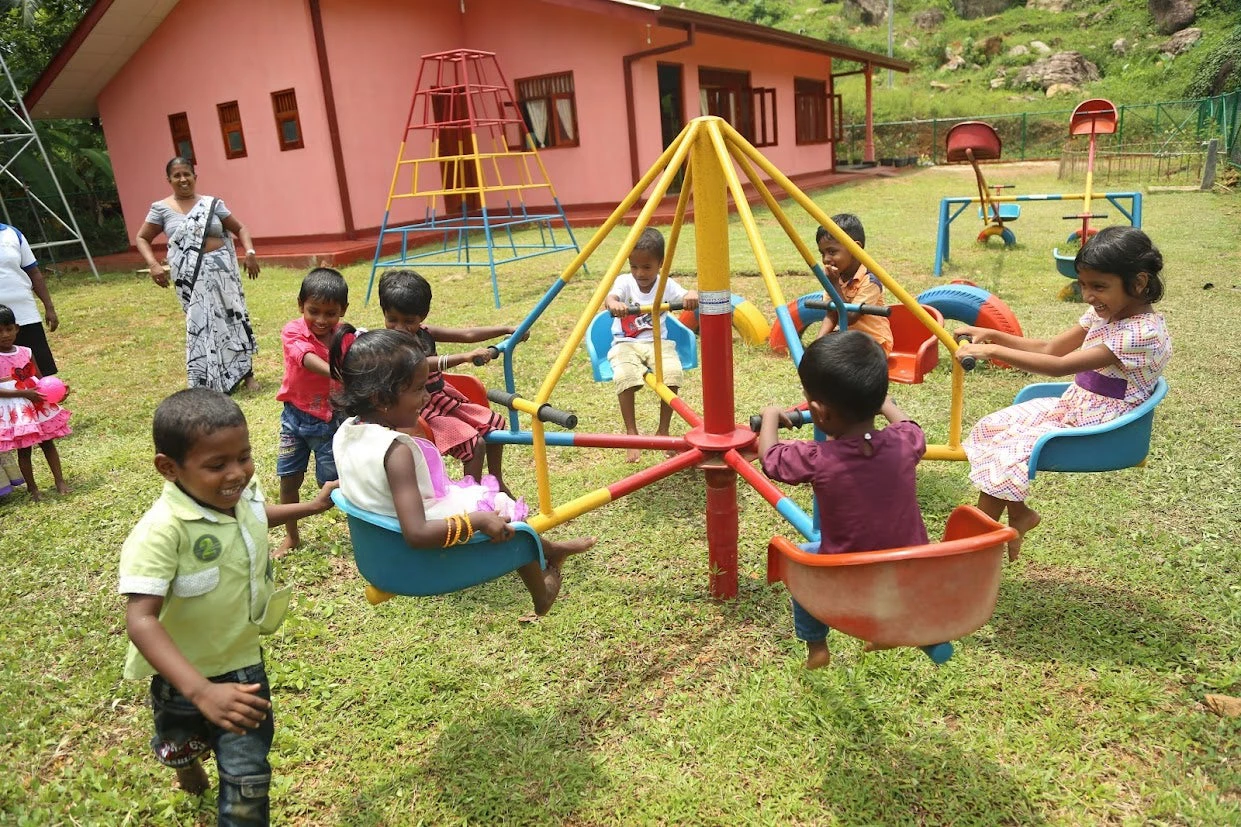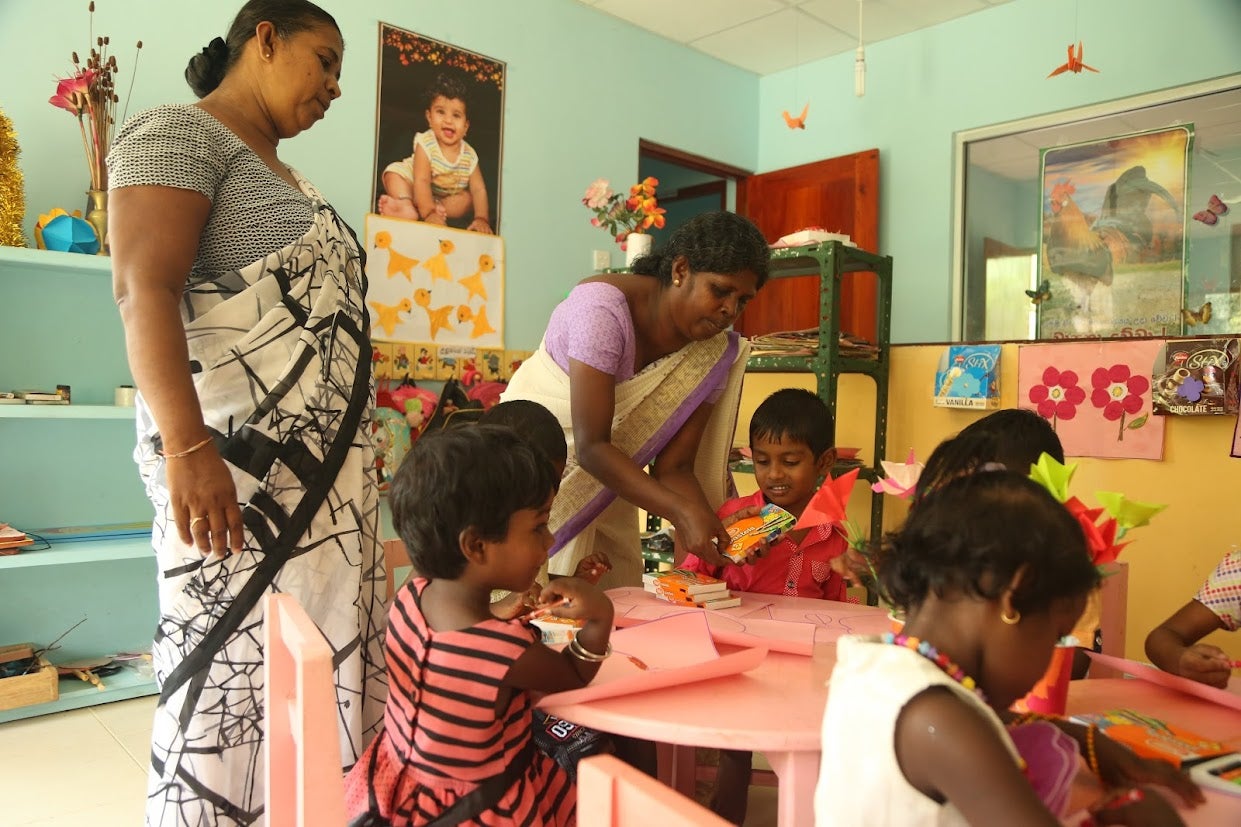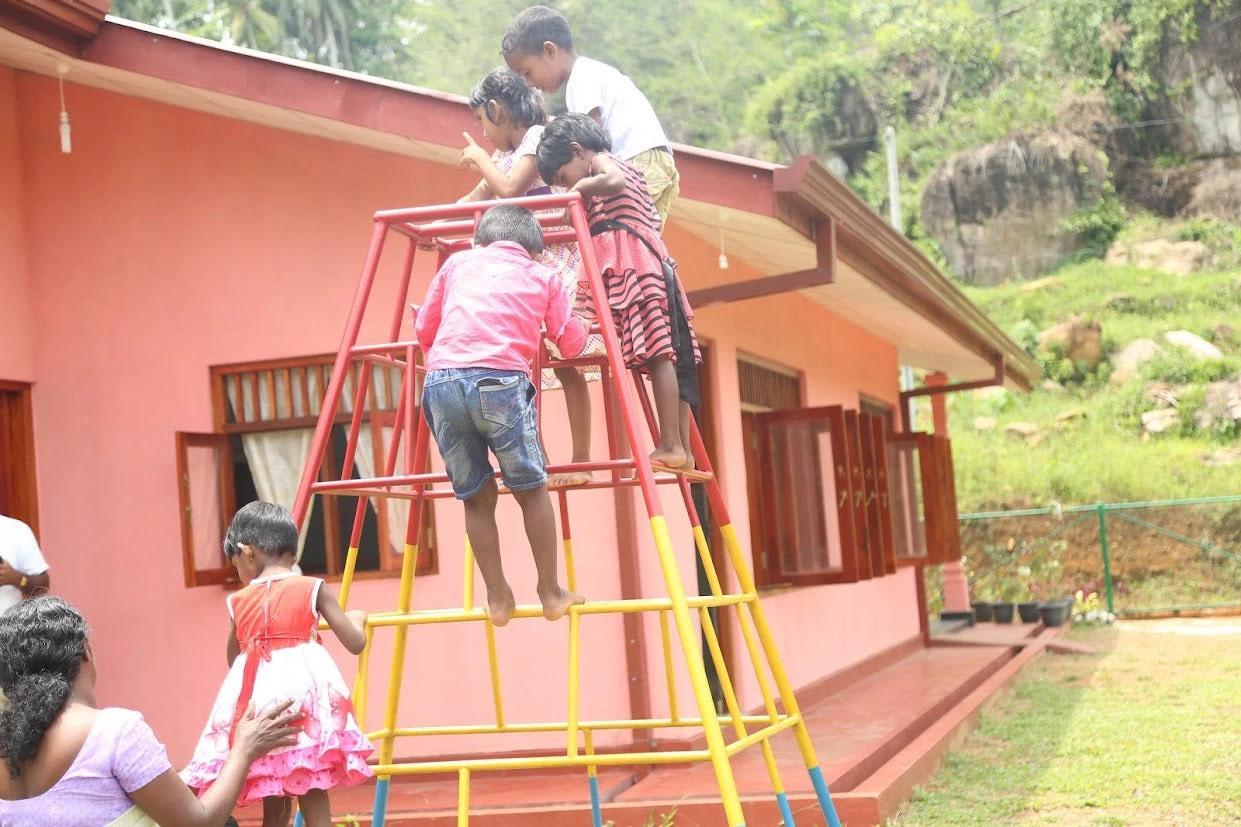 Photo of children playing at an ECD center in Sri Lanka
Photo of children playing at an ECD center in Sri Lanka
In the picturesque town of Nuwara Eliya, nestled among Sri Lanka's lush green tea fields, Shrestha's day begins early. As dawn breaks, she prepares her 4-year-old daughter to go to the public early childhood development (ECD) center located in the plantation estate where they live. This center, established just two years ago, ensures that while Shrestha is out picking tea leaves, her daughter receives excellent care and education. These centers not only provide peace of mind to parents like Shrestha, but they also symbolize a hopeful change.
The journey of the aromatic Ceylon tea that fills cups across the world starts with dedicated workers like Shrestha. A day's work is anything but predictable, contingent on factors such as rainfall, temperature, sunshine, relative humidity, and wind, all of which influence the tea yields and directly impact the quality of the leaves she can collect each day. Amid these uncertainties, Shrestha must ensure she gathers at least the minimum quota of 18 kilograms of high-quality tea leaves to earn her daily wage of LKR 1,000 (approximately USD 3.25). This not only guarantees her daily income, but also upholds Sri Lanka's reputation as a producer of the world's finest tea.
Deep-rooted developmental challenges
The early years of a child's life are crucial for overall development, and the lack of access to quality ECD services can have long-term negative consequences for cognitive, emotional, and social well-being. International evidence shows that children who have access to quality ECD services are more likely to perform better academically and have stronger socio-emotional skills as they grow older. Yet, according to an ECD census conducted by the government in 2016, nearly 44 percent of Sri Lankan children aged 3-5 were not enrolled in an ECD center.
Even among the fortunate few who have access to ECD services, quality has remained a persistent issue. Many public ECD centers suffer from poor physical infrastructure and facilities as well as inadequate training and support for child development officers. Additionally, the lack of national standards on ECD service delivery and quality assurance systems have traditionally compounded these challenges, affecting the quality of the ECD services provided to children.
Plantation areas face significant additional obstacles to providing ECD services, primarily due to their unique socio-economic and geographical landscape. These include the remoteness of plantation areas, , and limited infrastructure such as inadequate roads and lack of public transport. Additionally, the plantation sector is socio-economically disadvantaged. According to the 2016 Demographic and Health Survey, children under five in the plantation sector experienced severe stunting rates that were 2.4 times higher and severe underweight rates that were 4 times higher than those in other parts in the country. Many children from plantations also struggle to complete primary education and achieve their full potential, underscoring the importance of providing quality ECD services to children in these areas.
Public-private partnership to support ECD service delivery in Sri Lanka
To enhance access to public quality ECD services in the country, a public-private partnership was established under the Sri Lanka ECD project (2015-2023). The project supported community-owned ECD centers managed with government grants, by providing financial assistance for enrolled children, and capacity building for the ECD workforce. In the plantations, there was a partnership between the Ministry of Women, Child Affairs, and Social Empowerment, the World Bank, and the Plantation Human Development Trust (PHDT) – a tripartite organization consisting of the government, regional plantation companies, and plantation trade unions. Its objective was not only to improve existing services but also to initiate a transformative process in the ECD public service delivery in Sri Lanka’s plantation estates.
The government with support from the World Bank developed critical national quality standards for ECD in 2016, and 125 new Child Development Centers (CCDs) were built conforming to these quality standards benefiting many children under five in the plantation sector. The CDCs provide childcare and early childhood education services to children upto five years old. As of 2023, 695 CDCs have been upgraded to meet the new national quality standards, 620 CDCs have been conducting child development assessments developed under the ECD project.
To elevate the quality of the public ECD services provided, the child development officers (CDOs) needed training and support. Around 611 CDOs and teacher assistants were immersed in standardized short-term training programs to help them improve their teaching methods and understanding of early childhood development. Nearly 770 CDOs and teacher assistants also completed ECD certifications and diplomas.
This initiative also introduced a morning meal program, ensuring that children in the plantation sector had access to at least one nutritious meal a day. By 2023, about 23,386 children had benefited from the program. To further enhance nutritional support and sustain investments, an innovative initiative was adopted to cultivate vegetable gardens around the CDCs. The preparation of the morning meal program and cultivation of vegetable gardens have become a collaborative effort involving child development officers and parents who take turns in the kitchen and contribute to nurturing the gardens. This strong sense of community and shared purpose underscore the deep commitment of the community to their children's early development efforts.
Sri Lanka's journey in transforming ECD is an inspiring testament to what can be achieved with vision, collaboration, and commitment. Equitable access to quality ECD programs is no longer a dream, but a tangible reality for many children under five in Sri Lanka. By focusing on underserved areas like the plantation sector and partnering with various stakeholders, Sri Lanka is sowing the seeds for a brighter, more equitable future for its next generation.






Join the Conversation